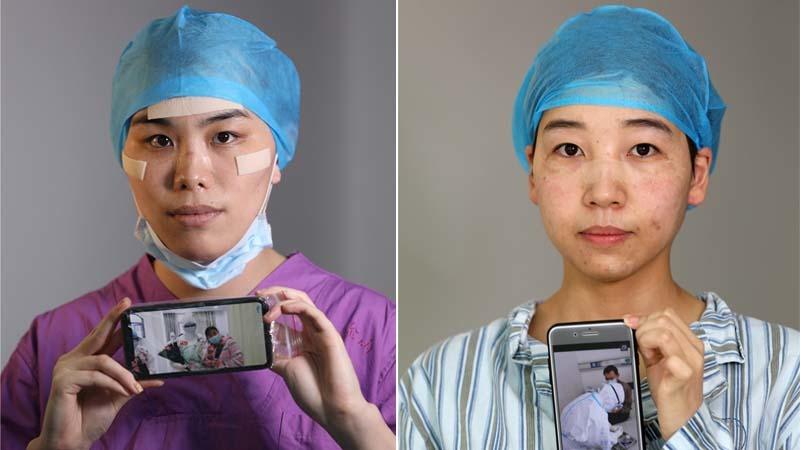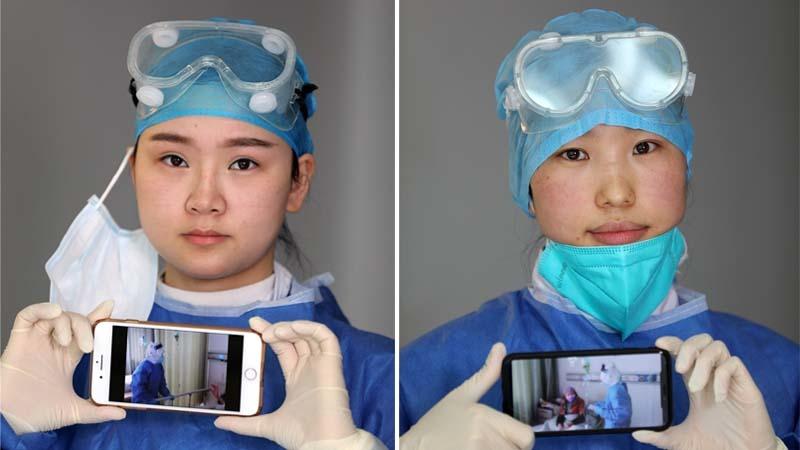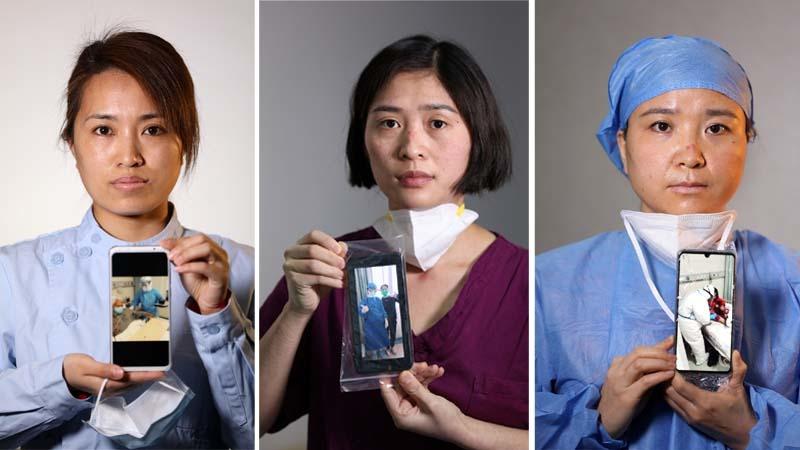 Chen Xiaolu (left) and Yang Tao, who helped fight the novel coronavirus outbreak in Wuhan, Hubei province, pose with their cellphones showing photos of them working in hospitals in the city. Volunteer photographers took a photo of each of the 42,000-plus medical workers from around the country who came to the aid of the hard-hit province. (LI GE / FOR CHINA DAILY)
Chen Xiaolu (left) and Yang Tao, who helped fight the novel coronavirus outbreak in Wuhan, Hubei province, pose with their cellphones showing photos of them working in hospitals in the city. Volunteer photographers took a photo of each of the 42,000-plus medical workers from around the country who came to the aid of the hard-hit province. (LI GE / FOR CHINA DAILY)
While they were busy treating COVID-19 patients in Wuhan, their faces were hardly recognizable under surgical masks and goggles.
In order to have a record of all the 42,000-plus medical workers who risked their lives to come to the aid of Hubei, the region of China hardest hit by the epidemic, a group of volunteer photographers undertook the massive project of taking a photograph of each one.
We want to use our cameras to record the faces behind the masks so that all of us can remember who they are.
Li Ge, Chairman of China Photographers Association and leader of the volunteer photographers
Behind the photos are individuals with touching stories of helping save patients and a strong sense of responsibility and dedication to their work, said Li Ge, chairman of the China Photographers Association and leader of the volunteer photographers.
"The public, patients and even their colleagues could not see the faces of the medical workers as they were wearing masks all the time. We want to use our cameras to record the faces behind the masks so that all of us can remember who they are," he said in an interview on Monday in Wuhan.
IN PHOTOS: Impressions of battle's front line
More than 42,000 medical workers around the country came to Hubei to work shoulder by shoulder with their local peers in battling COVID-19. The last medical team left the province on Wednesday as the number of remaining COVID-19 patients dropped below 150.
For the project, Li and four other photographers from the association left Beijing and arrived in Wuhan on Feb 20 to start work the next day. At the beginning, they took the photos in hospitals when the medical workers' shifts ended in order not to disturb their work.
"In the early days, there was not enough protective equipment, which had to be reserved for medical workers, so we went to the hospitals wearing only masks," Li said. "We did feel worried and nervous about our safety, yet as long as we started taking pictures, those feelings were quickly forgotten."
 Cai Xiaozhen (left) and Du Limin, who helped fight the novel coronavirus outbreak in Wuhan, Hubei province, pose with their cellphones showing photos of them working in hospitals in the city. (LI GE / FOR CHINA DAILY)
Cai Xiaozhen (left) and Du Limin, who helped fight the novel coronavirus outbreak in Wuhan, Hubei province, pose with their cellphones showing photos of them working in hospitals in the city. (LI GE / FOR CHINA DAILY)
Each photographer spent 10 to 12 hours every day at the hospital, but could take only 80 to 90 photos a day. To speed up the progress, the association asked for more photographers to voluntarily join the team.
The call was answered by around 60 photographers from the Hubei Photographers Association, Henan Photographers Association, photojournalists from other media organizations and photography enthusiasts among the medical teams. With the help of the central government work group in Hubei, photographers were later allowed access to medical workers' hotels, which also helped accelerate the process, Li said.
Photographers finished the entire project in about a month, which means that they took about 1,400 photos every day.Wen Fan, one of the doctors in a medical team from Shanghai, said two photographers from the Hubei Photographers Association took photos of all the 146 medical workers on the team on March 10.
ALSO READ: On the front line, with no time to spare
Some of the medical workers had just returned to the hotel from work and were very tired, which was reflected in their photos, he said.
"Young medical workers on the team are used to using filters or photoshop with their selfies, yet the portraits taken by these professional photographers recorded how we really looked and felt at the moment," he said. "The good and bad sides are all there and I think all of us will cherish the photos."
Li said that the power of photography lies in its faithfulness to what was occurring, and "all of us are very proud that we could be part of the team to record the heroes fighting the pandemic".
 Chen Yan (left) and Cai Jianghong, who helped fight the novel coronavirus outbreak in Wuhan, Hubei province, pose with their cellphones showing photos of them working in hospitals in the city. (LI GE / FOR CHINA DAILY)
Chen Yan (left) and Cai Jianghong, who helped fight the novel coronavirus outbreak in Wuhan, Hubei province, pose with their cellphones showing photos of them working in hospitals in the city. (LI GE / FOR CHINA DAILY)
The photos have already been widely used by media outlets across the country as well as being projected in major cities to commemorate the heroism of the medical workers, according to Li.
There have also been discussions about holding exhibitions, compiling photo albums, creating museum collections or setting up a special memorial hall for the photos, he said.
Along with taking the pictures, the photographers also recorded short videos of the medical workers talking about one thing they wanted to do most when they returned home.
Chen Xiaoyan, a nurse at Shaoxing Central Hospital in Zhejiang province, said she wanted to bring her family back to Wuhan to see the bustling streets.
 Meng Na (left), Xiao Yaping (center) and Jin Caiyun, who helped fight the novel coronavirus outbreak in Wuhan, Hubei province, pose with their cellphones showing photos of them working in hospitals in the city. (LI GE / FOR CHINA DAILY)
Meng Na (left), Xiao Yaping (center) and Jin Caiyun, who helped fight the novel coronavirus outbreak in Wuhan, Hubei province, pose with their cellphones showing photos of them working in hospitals in the city. (LI GE / FOR CHINA DAILY)
Xie Xiaona, a nurse at the First Affiliated Hospital of Nanchang University in Jiangxi province, said she wanted to see her child, who had just learned how to walk.
Huang Zian, from the First People's Hospital in Yongkang, Zhejiang province, said he had spent all the past five Spring Festivals at the hospital and he really wanted to come home and be with his family.
READ MORE: The quiet heroes of Wuhan
Li said they did not ignore the local medical staff who had been working at the front line from the very first. Around 150,000 medical workers in Wuhan and more than 500,000 in Hubei have been engaged in the fight against the contagion, but it was impossible to take photos of all of them during the epidemic as the group is too big.
"We encourage more photography enthusiasts to come to Hubei to take photos of them after the outbreak," he said.


